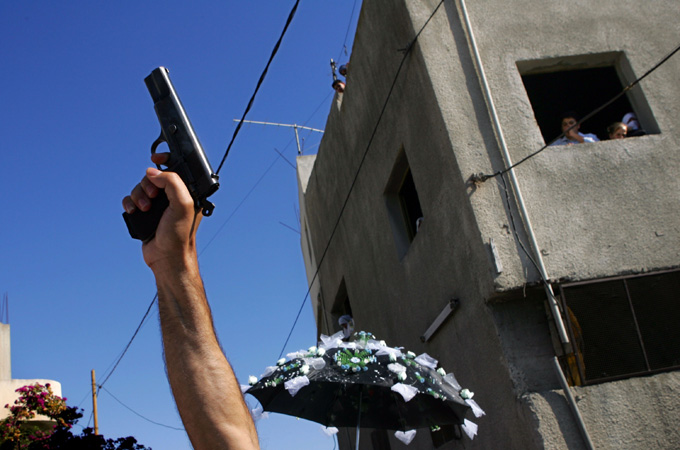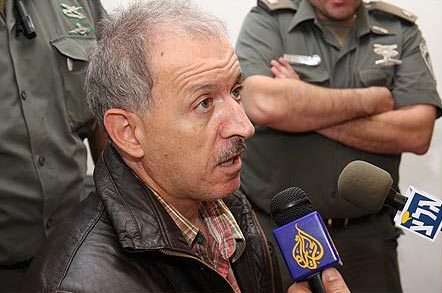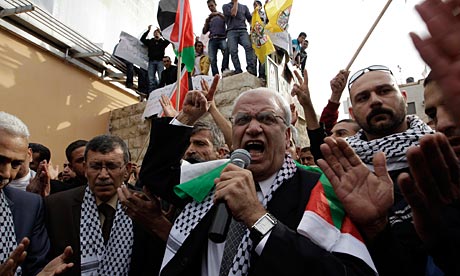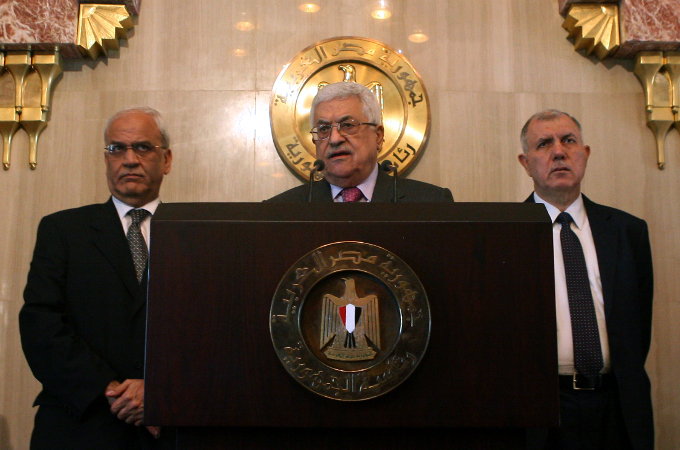EDITOR: Egypt’s revolution affecting all around
Despite the still unclear results of the Egyptian mass movement towards ridding the country of its dictator and his corrupt regime, the momentous events sent waves of terror towards Israel and the other corrupt Arab regimes surrounding it. With Rafah being the single, fragile gateway into and out of Gaza, this is a difficult time for Palestinians there, who, like most of us, are wishing success to the marchers in Egyptian cities, who share with them the need and urge for freedom and democracy.
Concern mounts in Gaza as Egypt shuts down its shared border: Haaretz
Gaza border official Ghazi Hamad says Egyptian counterparts indicated the crossing could remain closed for several days.
There was widespread concern in the Gaza Strip on Sunday after Egypt decided to shut down the Rafah border crossing until further notice amid growing unrest.
The Islamist Hamas movement, which rules the Gaza Strip, said it was officially informed by Egyptian security officials that the Rafah crossing would be closed.
Gaza border official Ghazi Hamad said they had been in contact with their Egyptian counterparts and indicated that the crossing could remain closed for several days.
The Interior Ministry in Gaza said in a press statement Saturday that it had redeployed dozens of security personnel to guard the border, to prevent any infiltration of Palestinians from the coastal enclave into Egypt.
Salah al-Bardaweel, a senior Hamas leader in Gaza, said there was so far no official Hamas position on the turmoil in Egypt.
“All what we hope is to see calm and stability are back in Egypt and that the Egyptian people choose their representatives freely and democratically,” said al-Bardaweel.
In a Gaza city cafe, a group of young men expressed concerns over the situation in Egypt. Mohamed al-Shawa said, “We depend on Egypt in so many things in our life, and Egypt has been always our gate for the outside world … we are afraid that Egyptian fuel would be cut off.”
Ahmed Abu Sido, another young Gazan, said: “If the regime in Egypt collapses, I believe that all Arab regimes will follow.”
‘Don’t take our girls …’: Al Jazeera online
Jewish-Palestinian couples in Israel face increasing pressure as racism becomes more open.
”] Not long after religious nationalists held a rally in Bat Yam under the banner of “Jewish girls for the Jewish people,” a group of rabbis’ wives published a letter urging Jewish women not to date Arab men.
Not long after religious nationalists held a rally in Bat Yam under the banner of “Jewish girls for the Jewish people,” a group of rabbis’ wives published a letter urging Jewish women not to date Arab men.
Jewish-Palestinian couples remain uncommon in Israel. But both the rally and letter point towards the difficulties faced by such couples, even those from liberal backgrounds.
Rona, a young professional Jewish woman in her early thirties who asked to be identified by a pseudonym, has kept her relationship with a Palestinian man a secret from most of her relatives for almost four years.
While her parents know and have met Rona’s boyfriend, Rona says that she is at a point where she is “actively lying” to the rest of her family.
“I don’t know how to articulate how they’d react, “Rona says. “I think that my aunt and uncle know that there is someone … and they definitely know that he’s Arab. But it’s more about my grandmother and her sisters and the older generation. It’s like if [I] were to bring home a mass murderer.”
She laughs nervously and continues.
“It just doesn’t happen. It’s like: ‘Bring home somebody who is a total loser, but don’t bring home an Arab.'”
Rona describes her parents’ political views as “moving more left but kind of traditional,” adding, “my mum always says that she thinks that the occupation of Gaza and the West Bank in 1967 was a mistake and that [Israel] should have returned the territories.”
Still, Rona did not tell her parents about her relationship right away.
“There was a period of time I was hiding it for convenience’s sake. I just wanted to enjoy my life and not be harassed.”
When she did talk to her parents about her boyfriend, who is a non-practicing Muslim, they sidestepped the issue of his race, focusing instead on “cultural differences”.
“I was like, ‘What are you saying? That he’s going to come home one day and want me to put on a hijab? Do you know what the cultural differences are?'” Rona recalls. “So I took immediate offense to this concept. I thought it was racist from the get go.”
Her parents also objected to the relationship because “it would be so difficult for us to live here together,” Rona says, due to the widespread discrimination they would face.
She describes the first time her parents met her boyfriend as “awkward”.
“I think it was actually their first personal interaction with an Arab, other than [those working in] stores and restaurants. I think it was a very emotional encounter for them. They liked him and my mum said he seemed like an amazing guy.”
Still, Rona’s mother insisted that she not put herself “in that kind of a situation”.
Rona says that she has not felt any racism coming from her boyfriend’s family. But, because of the political situation, there are moments when she feels a divide between them.
She was living with her boyfriend when Operation Cast Lead began in December, 2008. Her boyfriend’s mother, whose sister lives in the Gaza Strip, happened to be visiting when the war began.
“We were watching the news and they were showing the first strikes, the air attack,” Rona recalls. “His mum was screaming and crying and cursing the army and the Israelis and the Jews and everyone and I was standing there like ‘I don’t know what to do.’ On the one hand, I wanted to show her that I care. On the other, does she now want an Israeli Jew to put her arm around her? But I did.”
History of mixed marriages
Although Israel’s religious nationalists have only recently spoken against such relationships, they are far from new. Jews and Arabs have been falling in love in Palestine for as long as both have been there.
Iris Agmon, a professor in Ben Gurion University’s department of Middle East studies, says: “In the Ottoman sharia court records one can find women whose nicknames hint to the fact that they are converted Muslims.” And some of these women were probably Jewish.
After Ottoman rule ended, the British mandate also saw such couples. Deborah Bernstein, a professor in the University of Haifa’s department of sociology and anthropology, says that although there is no “systematic documentation or even discussion of the subject … it is clear that such a phenomena did exist”. She found family stories of these couples while researching her Hebrew-language book about women in mandatory Tel Aviv.
Bernstein also discovered “archival welfare documents,” pointing to such relationships. “For example, [one referred to] a [Jewish] woman leaving her husband and children and going to live with an Arab man.”
In most cases, Bernstein says, Jewish women converted to Islam before marrying their Arab partner. She believes that a majority of these couples left Israel when it was established in 1948.
Bernstein did not come across any examples of Jewish men marrying Christian Arab or Muslim Arab women.
Bernstein adds that the Jewish community was “very strongly opposed” to “mixed marriages”.
“This was the case in [Jewish immigrants’] countries of origin,” Bernstein says, explaining that the opposition to mixed marriages took on an “additional national element” in Israel.
But, sometimes, protests against such relationships ran the other way – leaving a lasting impact on generations to come.
The Palestinian grandson of such a marriage lives in a neighbouring Arab country. According to Jewish religious law, he is not Jewish. While, technically, many of his cousins are Jewish, they do not know it – their grandmother’s conversion is a strictly-guarded secret, shared with only a few members of the family.
Segregation
Because it remains an extremely sensitive issue for both communities, a number of Jewish-Palestinian couples declined my requests for interviews. Several are so concerned about family reactions, they have not told their parents about their Jewish or Arab partner.
But Alex and Salma are lucky. Alex is the son of Jewish Israeli leftists. Salma is a young Palestinian woman whose Communist parents raised her and her four sisters with only a nod to their Christian roots. Because their families are so progressive, Alex says, their relationship is “relatively simple”.
“The first song I learned to sing was shir l’shalom [song for peace]. We’ve gone to demonstrations since I was a toddler. So I was always on the left,” he explains, “but I never knew any Palestinians.”
Alex’s comment points to the deep divisions in Israeli society that make Jewish-Palestinian relationships so unlikely.
“[Society] is built in a way that doesn’t help relationships,” Salma says. “Everything is segregated. The educational systems are separated … People don’t meet. And if they do meet, they meet under unusual circumstances, like at a demonstration.”
Even though both Alex and Salma grew up in liberal homes, the two were no exception – it was activism that brought them together.
And it helps keep them together. Most of their friends hold similar political views, providing a buffer from the rest of Israeli society.
“You know, we sort of chose our lives,” Salma says. “I can’t be friends with racist people so it’s easy to avoid. But I think if we would have gone out to more parties we would have faced more problems.”
Still, things are only “relatively simple”.
Alex recalls running into a friend from school who made a racist and obscene remark about his relationship with Salma. And one of Salma’s closest childhood friends stopped speaking to her when she joined a Jewish-Arab group that advocates for a bi-national solution to the conflict.
“I think it comes out more than that,” Alex adds.
Salma nods and begins to explain: “I have one sister who got married last summer. She knows Alex and his family very well, so she wanted to invite [them] …”
She pauses and, a bit like an old married couple, Alex picks up the thread and continues: “And the oldest sister says, ‘What are you going to invite all of your Zionist friends?'”
There is a flicker of hurt on Alex’s face as he remembers. “Now, this comes out of nowhere. I refused [mandatory military service],” Alex says. “I’m definitely not a Zionist. I refused and my parents aren’t Zionists.”
Alex emphasises that he maintains a warm relationship with Salma’s oldest sister and that her remark came during an emotional argument. But, Alex says, the incident pointed to something that “can’t be completely erased … that the relationship can’t be normalised. It always has to be politically justified.”
What do such tensions say about Israeli society?
“Nothing good,” Alex answers.
The couple is also concerned about the recent outbreak of open racism in Israel.
“I think the hatred is becoming more and more explicit,” Salma says, pointing to the rally in Bat Yam and the rabbis’ wives’ letter as two examples. “It’s ‘don’t take our girls’ ….”
Israeli Arab who spied for Hezbollah jailed for nine years: Haaretz
Ameer Makhoul was detained by the Shin Bet and police anti-terror units last May; struck plea bargain with prosecution.

The Haifa District Court on Sunday sentenced Israeli Arab activist Ameer Makhoul to nine years in prison and another year suspended sentence for charges of spying and contact with a foreign agent from the Lebanon-based Hezbollah militant organization.
Makhoul’s lawyers struck a plea bargain with the prosecution in October 2010, in which they asked for a reduced sentence of seven years, while the prosecution asked for 10 years – the maximum sentence for the charges against him.
The verdict stated that Makhoul handed intelligence to a Hezbollah agent on Shin Bet installations in the Haifa region and on Mossad offices in the center of the country. He also attempted, the verdict said, to pass on information about a military base and sought details about the residence of Shin Bet chief Yuval Diskin.
Makhoul, director general of the charity Ittijah (Union of Arab Community-Based Associations), was detained by the Shin Bet security services and police anti-terror units on May 6, along with fellow Israeli Arab activist Omar Saeed.
Saeed struck a plea bargain in August, under which he will be charged with working for an illegal organization, a crime that carries a punishment of several months’ jail-time.
Upon his arrest, Makhoul was kept from meeting with a lawyer or speaking with his family for nearly two weeks, during which he confessed to the accusations. His lawyers later claimed the confession was coerced. They were finally allowed access to Makhoul only after threatening to boycott a hearing.
Makhoul, a veteran activist well-known among Arab charities and NGOs, was a regular participant in conferences on discrimination in Israel and abroad and has been a virulent critic of government policy.
Europe’s failure on Middle East peace: The Guardian CiF
Attempts to reconcile policy contradictions have prevented the EU from mounting an alternative foreign policy to that of the US
Many have questioned why the European Union failed to provide an independent view to that of the United States on Middle East policy during the last decade. It is not a simple question to answer. Partly, the EU failed to assert its voice because, at the beginning of the decade, it was scrambling to contain the impact of inflating US hubris, fuelled by the defeat of Saddam Hussein. Partly, it was also a simple reflection of most European politicians’ dependency on Washington. But the release of the Palestine Papers provides another answer.
They show how Tony Blair in particular had so undercut the political space that there was effectively no room for it. In a secret policy switch in 2003, he tied the UK and EU security policy into a major American counter-insurgency (Coin) “surge” in Palestine.
It was an initiative that would bear a heavy political cost for the EU in 2006, and for years to come, when Hamas won parliamentary elections by a large majority. The EU’s claims for democracy have rung hollow ever since. Blair’s “surge” also left the EU exposed as hypocrites: on a political level, for example, the EU might talk about its policy of fostering reconciliation between Palestinian factions, but at the security plane, and in other ways, it was pursuing the polar opposite objectives.
In 2003, US efforts to marginalise Yasser Arafat by leeching away his presidential powers into the embrace of the prime minister, Mahmoud Abbas, collapsed. Arafat dismissed Abbas as PM. This was a blow to the US policy which – even then – was focused on creating a “de-Fatah-ised” Palestinian Authority. George Bush complained to Blair bitterly about Abbas’s dismissal: the Europeans still were “dancing around Arafat” – leaving the US to “do the heavy lifting” with the Israelis. Europeans were not pulling their weight in the “war on terror”, Bush concluded.
Blair’s Coin surge was his response to Bush. The Palestine Papers reveal “a security drive” with the objective of
“degrading the capabilities of the rejectionists: Hamas, PIJ [Palestinian Islamic Jihad], and the al-Aqsa Brigades – through the disruption of their leaderships’ communications and command and control capabilities, the detention of key middle-ranking officers, and the confiscation of their arsenals and financial resources held within the occupied territories. US and – informally – UK monitors would report both to Israel and to the Quartet. We could also explore the temporary internment of leading Hamas and PIJ figures.”
The papers also show how the project ballooned: a huge investment in training and infrastructure of the security services, building prisons to accommodate the possible introduction of internment for Hamas members, the establishment of the Dayton military battalions to confront Hamas, the planning to depose Hamas in Gaza, the targeted assassination of Hamas leaders. Even the international Quartet was engaged to work with Arab states’ intelligence services in order to disrupt Hamas’s sources of financing.
The “surge” sucked in everything: aid, economic assistance, institution-building – all were reoriented towards the counter-insurgency project. Ultimately, the Palestinian state-building project, and the Coin surge, were to become one.
Against this counter-insurgency background it is not surprising that Hamas’s victory in the 2006 polls only prompted a further increase in European “off-balance sheet” assistance to the EU/US-made security sector. At a political level the Europeans were attempting to keep an independent voice, the Palestine Papers show, when EU envoy Marc Otte spoke with Saeb Erekat two months after the Hamas election.
Otte: EU has to deal with the reality of a Hamas-led government … In this respect, EU position is different from the US.
Erekat: How is this position different?
Otte: US wants to see a Hamas government fail. The EU will encourage Hamas to change and will try to make things work as much as possible.
Inevitably, the EU’s actions spoke louder than Otte’s words. The EU had endorsed the Quartet conditions for engagement with Hamas – conditions that the UN representative at the time told the UN secretary general were hurdles raised precisely in order to prevent Hamas from meeting them, rather than as guidelines intended to open the path for diplomatic solutions. Soon after, British and American intelligence services were preparing a “soft” coup to remove Hamas from power in Gaza.
EU standing in the region has suffered from the contradiction of maintaining one line in public, while its security policies were facing in another direction entirely. Thus, we have the EU “talking the talk” of reconciliation between Fatah and Hamas while “walking the walk” of disruption, detention, seizing finances, and destroying the capabilities of one of the two factions.
Thus we have EU “talking the talk” of aid for Palestinians, while “walking the walk” of tying that aid to the objectives of the US security project; we have the EU “talking the talk” of Palestinian state-building, while Palestinian institutions are dispersed to external control; we have the EU “talking the talk” of democracy, while it colludes with a system of government exercised through unaccountable decree, and parliament is prevented from exercising any function.
This catalogue of attempts to reconcile an internal policy contradiction has pre-empted the EU from mounting any effective foreign policy alternative to that of the US on the “peace process”, and has eaten away its standing in the region. The legacy of Blair’s 2003 surge has been a highly costly one, as the Palestine Papers well illustrate.
• This article appeared first on al-Jazeera. Copyright reserved.


